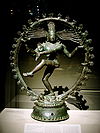Shiva Mahimna Stotra

| Part of a series on |
| Hindu scriptures and texts |
|---|
 |
| Related Hindu texts |
| Part of a series on |
| Shaivism |
|---|
 |
|
|
The Shiva Mahimna Stotra (Sanskrit: शिवमहिम्न:स्तोत्र, romanized: śiva-mahimnaḥ stotra, lit. 'Hymn about the greatness of Shiva') is a Sanskrit composition (stotra) in praise of Shiva. According to tradition, the hymn is believed to have been composed by a gandharva (celestial musician) named Pushpadanta.[1][2] The hymn lists Shiva's various achievements and qualities.
Legend
[edit]Pushpadanta, the chief of the gandharvas, had the habit of stealing flowers for the worship of Shiva from the garden of King Vahu. Possessing the ability to walk upon the air, the gandharva entered the garden by night. Unseen by the keepers of the garden, he collected a large number of flowers for the veneration of the deity in the morning. First perplexed by this event, the keepers eventually deduced the ability of the thief. They hatched a plan to place flowers sacred to Shiva (bilva leaves in other accounts) in several locations of the garden, hoping that the intruder would tread upon them in the dark and be cursed by the deity to lose his ability and foil his crime. Accordingly, Pushpadanta walked upon the flowers and lost his ability to walk upon the air. Caught and arrested, the gandharva sang the Shiva Mahimna Stotra to the angered king when he was brought to him in repentance.[3]
In a variation of this legend, pleased with the recitation of the hymn, Shiva absolved the gandharva of his crime and restored his powers.
Hymn
[edit]The first stanza of the hymn extols the greatness of Shiva:[4]
mahimnaḥ pāraṁ te paramaviduṣo yadyasadṛśī
stutir brahmādīnām api tadavasan nāstvayi giraḥ
athāvācyaḥ sarvaḥ svam atiparimāṇāv adhigṛṇan
mamāpy eṣa stotre hara nirapavādaḥ parikaraḥ
O Shiva, remover of all types of miseries, what wonder is there, if the prayer to you, chanted by one who is ignorant about your greatness, is worthless! Even the utterance of Brahma and other gods is not able to fathom your merits. Hence, if persons with very limited intellect try to offer you a prayer, their attempt deserve your special favour. If it is so, I should not be an exception. Hence, I begin this prayer.
See also
[edit]References
[edit]- ^ Jan Gonda (1977). A History of Indian Literature: Epics and Sanskrit religious literature. Medieval religious literature in Sanskrit. Otto Harrassowitz Verlag. pp. 259–. ISBN 978-3-447-01743-5.
- ^ Anthony Kennedy Warder (1988). Indian Kāvya Literature: The bold style (Śaktibhadra to Dhanapāla). Motilal Banarsidass. pp. 78–. ISBN 978-81-208-0450-0.
- ^ Journal. 1840. p. 355.
- ^ Pushhpadanta (2005). Shiva Mahimna Stotram. pp. 7–8.
Further reading
[edit]- Encyclopedia of Hinduism - Volumes on Shiva Ed. by Nagendra Kumar Singh

